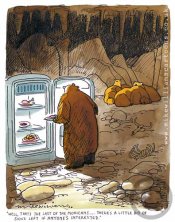Not my job.
Dear Word Detective: My sister and I have a bet regarding the phrase “passing the buck.” I think it refers to the early 19th century Kansas frontiers when it was common to pass around large plates of venison. She insists that the phrase originated when the term “greenbacks” was shortened to “backs” and then “bucks,” which makes even less sense. We clearly need your help. — Daniel Jorgenson.
 Large plates of venison? I’ll pass, thanks (and yes, I’ve tried venison, many years ago). For some reason, that theory reminds me of a Mike Williams cartoon from Punch we used to have taped to our refrigerator, which showed a bunch of bears lounging around in their cave. One is peering into the refrigerator and saying, “Well, that’s the last of the Mohicans … there’s a little bit of Sioux if anyone’s interested.” (Cartoonist’s website is here.)
Large plates of venison? I’ll pass, thanks (and yes, I’ve tried venison, many years ago). For some reason, that theory reminds me of a Mike Williams cartoon from Punch we used to have taped to our refrigerator, which showed a bunch of bears lounging around in their cave. One is peering into the refrigerator and saying, “Well, that’s the last of the Mohicans … there’s a little bit of Sioux if anyone’s interested.” (Cartoonist’s website is here.)
To “pass the buck” today means to evade responsibility by shifting it to another person. The term comes from the game of poker as played in 19th century America, where players took turns acting as dealer. To keep track, a marker known as the “buck,” often a knife with a handle made of buck horn, was placed on the table in front of the dealer, and passed to the next player before each round (“I reckon I can’t call that hand. Ante and pass the buck,” Mark Twain, 1872). By the early 20th century, “pass the buck” had spread from meaning “to transfer responsibility from one poker player to another” to meaning “to shift responsibility for anything to another person,” the sense we use today.
Although “buck passing” is a core survival skill for anyone working in a large organization (especially a government bureaucracy), being on the receiving end of “Oh no, you need to talk to the Office of Non-Euclidean Contingencies, Room 647 in Building B-104″ can be very annoying. It’s even more annoying when the bureaucrat saying that is a politician you voted into office. So in 1949, when President Harry Truman put a sign on his Oval Office desk announcing that “The buck stops here,” he meant that he would accept ultimate responsibility for the actions of his government. Whether that promise was kept is, of course, a matter of opinion, but the slogan was an instant hit and “the buck stops here” is still invoked dozens of times in every presidential race.
As for your next question (I’m psychic), why a dollar is known as a “buck,” the answer is uncertain. Some say that it comes from the use of deer hides (“buckskins”) as currency worth one dollar in early America, but buckskins were worth more than that and “buck” meaning “dollar” didn’t become popular until the 20th century. It’s more likely, in my opinion, that “buck” in this sense is derived from the slang “sawbuck,” meaning a ten-dollar bill. The Roman numeral “X” (meaning ten) was emblazoned on early ten-dollar bills, and resembled a “sawbuck” (from the Dutch “zaag-bok”), or what today we call a “sawhorse.” Since a “sawbuck” was worth ten dollars, people may have assumed (especially after the “X” was removed from the bills) that “saw” had something to do with “ten,” so just one dollar must be a “buck.” That’s just my own theory, of course, but I like it.




Leave a Reply